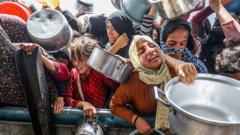As conditions worsen, the UN warns that the entire population of Gaza faces acute food insecurity, with urgent calls for humanitarian assistance amidst accusations of deliberate starvation tactics by Israel.
Humanitarian Crisis in Gaza: UN Official Calls for Urgent Aid Amidst Blockade

Humanitarian Crisis in Gaza: UN Official Calls for Urgent Aid Amidst Blockade
The ongoing conflict in Gaza has led to severe food shortages, with the UN claiming that Israel's actions are tantamount to the weaponization of humanitarian aid.
The current humanitarian situation in Gaza has reached unprecedented levels of crisis. According to UN officials, the systematic blockade imposed by Israel is creating dire conditions for civilians, leading to accusations that food deprivation is being used as a weapon of war. Pascal Hundt, the International Committee of the Red Cross's deputy director, painted a bleak picture of life in Gaza, where civilians are enduring relentless danger and severe shortages of essential supplies due to restrictions imposed since early March.
The escalation of violence since March 18, when Israel resumed a series of airstrikes, has compounded the already critical humanitarian crisis. The war had previously seen a ceasefire that allowed for some respite, but ongoing hostilities have led to a complete halt in the delivery of humanitarian aid, including food and medical supplies. Israeli Prime Minister Benjamin Netanyahu, under pressure from right-wing factions, has vowed to continue aggressive military actions that may further displace millions in Gaza.
Plagued by overcrowded living conditions even before the war, Gaza's population is now facing a dire future, with 70% of the territory being reported as inaccessible to civilians. UN estimates suggest that nearly 2 million inhabitants, including a significant number of children, are at risk of famine. Philippe Lazzarini, the commissioner-general of the UN Relief and Works Agency (UNRWA), expressed despair over the dire conditions, stating that “people are exhausted, people are hungry” and warned that starvation might soon surpass casualties from airstrikes.
Aid organizations like the IPC have classified the situation as critical, warning that 22% of Gaza's population is in a state classified as "Phase 5 – catastrophe," where starvation is imminent. Lazzarini emphasized that while the plight of the people in Gaza may lead to accusations of genocide, much of the destruction can be attributed to the blockade's restrictions on humanitarian aid. He is adamant that denying civilians access to food and aid aligns with war crimes under international law.
Israeli officials have openly justified the blockade as a strategy intended to apply pressure on Hamas. These tactics have caused significant distress among Israeli families with loved ones taken hostage, pointing to a deep division within Israeli society regarding the political motivations behind military engagements. The ongoing conflict has drawn criticism from the international community, including allies who question whether the brutal military strategies employed are a legitimate response or merely a perpetuation of historical grievances.
Critics of Israel's policies have pointed to what they see as an moral collapse, with implications that current strategies could lead to long-term consequences for both Israelis and Palestinians. As the crisis unfolds, Lazzarini warns that the inaction and indifference displayed by the international community are complicit in the ongoing atrocities, underscoring a looming moral reckoning that may reshape perceptions of the conflict for generations to come.
The call for humanitarian aid remains urgent, as future possibilities for peace appear ever more distant amid cycles of violence and allegations of war crimes. As observers lament the suffering of the Gazan people, the need for immediate intervention has never been clearer.



















